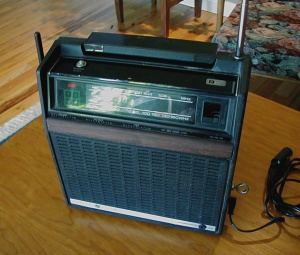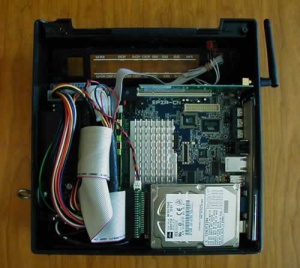8track: Difference between revisions
Brian Wilson (talk | contribs) mNo edit summary |
Brian Wilson (talk | contribs) |
||
| Line 14: | Line 14: | ||
slim case that fits on the back of my computer desk. | slim case that fits on the back of my computer desk. | ||
8track has | |||
# 1GB of DDR2 RAM | # 1GB of DDR2 RAM | ||
Revision as of 16:12, 24 August 2007
My quest for low power systems began in my Carbon diet page and now it continues with this system. It is smaller, faster, and uses less energy than the earlier Via EPIA 800 system. I migrated from the C3 to the C7 system.
When I was riding around Corvallis one day, I saw a pile of free stuff in front of someone's house. Right on top was a GE portable AM/FM 8 track player. I could not pass it up. I immediately envisioned putting a computer in the case and that is exactly what happened.
I realize now that I could probably have sold it for $10 on Ebay! Well, I have gotten more than $10 worth of entertainment out of it so far.
I used 8track as the unofficial [Solar CREEK kiosk] at DaVinci Days 2006. It ran off solar power all day playing a video and allowing access to the Solar CREEK Web site.
Hardware specs
"8track" was originally a complete computer system based on a Via CN10000 Mini-ITX board built inside the 8 track player case. Alas, the spendy Morex automotive power supply died when it was less than a year old. Rather than throw more money at Morex, I replaced the case with a commercially built slim case that fits on the back of my computer desk.
8track has
- 1GB of DDR2 RAM
- a 100 GB 7200 rpm Seagate SATA drive
- Casetronic case
With the Morex automotive supply the power options included using either an old HP Omnibook 800 laptop power supply or a 12 volt gel cell. At the Solar CREEK booth at DaVinci Days, I ran it on a solar panel and a 120 vac inverter.
I used the 2.5" drive because the Morex will not support the power requirements of a 3.5" drive on its 12V output. The original Toshiba 4200 rpm 30 GB drive was IDE (PATA) and plugs into a 44-40 pin adapter. The Seagate drive is a huge improvement.
At DaVinci days, I used an Acer 15" display and a PS/2 keyboard and mouse. The monitor ran off the inverter, too. I plugged in stereo speakers and connected to the Solar CREEK web site via a wireless link.
The HP power supply puts out about 35 watts and it had no trouble running this machine in the above configuration. I measured output of the supply and found it takes about 10 watts to run.
CN10000 mainboard
I bought the CN10000EG fanless C7 board and the Morex power supply from Logic Supply. It took them three tries to get the right wires send out for the power supply but they were nice about it. I got my EPIA mainboard from them, too.
VIA CN700 north bridge VIA VT8237R south bridge LAN: VIA VT6103 10/100 AUDIO: VIA VT1618 8 channel AC'97 codec
File:CN10000.pdf PDF manual
Software
I am running Ubuntu Linux on it at the moment (7.04 Feisty Fawn).
Multimedia
Basically both audio and video playback on this box suck.
They skip and hop.
I am looking at this problem right now. (5-Oct-06)
Where is it now?
8track is now the machine we use here at home 95% of the time. It is so power efficient and quiet that I use it in preference to either the laptop or the old desktop system for most of my work.
The sad part is the case is on the back of my monitor so it's not normally visible! Oh well.
Next planned upgrade is to replace the 5400 rpm 30 GB hard drive with a 100 GB 7200 rpm SATA drive so that I can start using it as a file server; it replaced my C3 system that had a 200 GB 3.5" drive in it.
I want to get some accurate power measurement equipment pieced together before I go any further with the Carbon diet so 8track is on hold for the moment.
Pictures

A wood strip is fitted to cover over empty slots left when I removed the various controls (volume, tone and so on.) It fits the style of cases of this vintage though it's real hardwood not contact paper!

Here you can see the interior layout.
There is enough room at the top of the case to accomodate an LCD display. The Trendnet Wifi card fit in easily once I removed its card slot adapter.
I used a router* to enlarge the 8-track slot to fit the mainboard back panel. The styrene plastic is very easy and clean to work with a carbide bit. I probably won't get cancer for many more years.
The large metal ring on the left is an eye bolt to allow me to lock down the case when I leave it unattended in public places.
- Def router: a motor with a spinning cutter attached, not a network device.
Building a custom kernel
The C7 processor is not supported by default but you can add it:
http://www.swintabletennis.com/blog/?p=22
http://www.howtoforge.com/kernel_compilation_ubuntu_p2?s=2e4e7db1d3b0009a48132ba132e72f9e&
make-kpkg clean fakeroot make-kpkg --initrd build kernel_image kernel_headers modules
This builds the packages up one layer, you have to go there and install them.
cd .. sudo dpkg -i packagename ..and so on